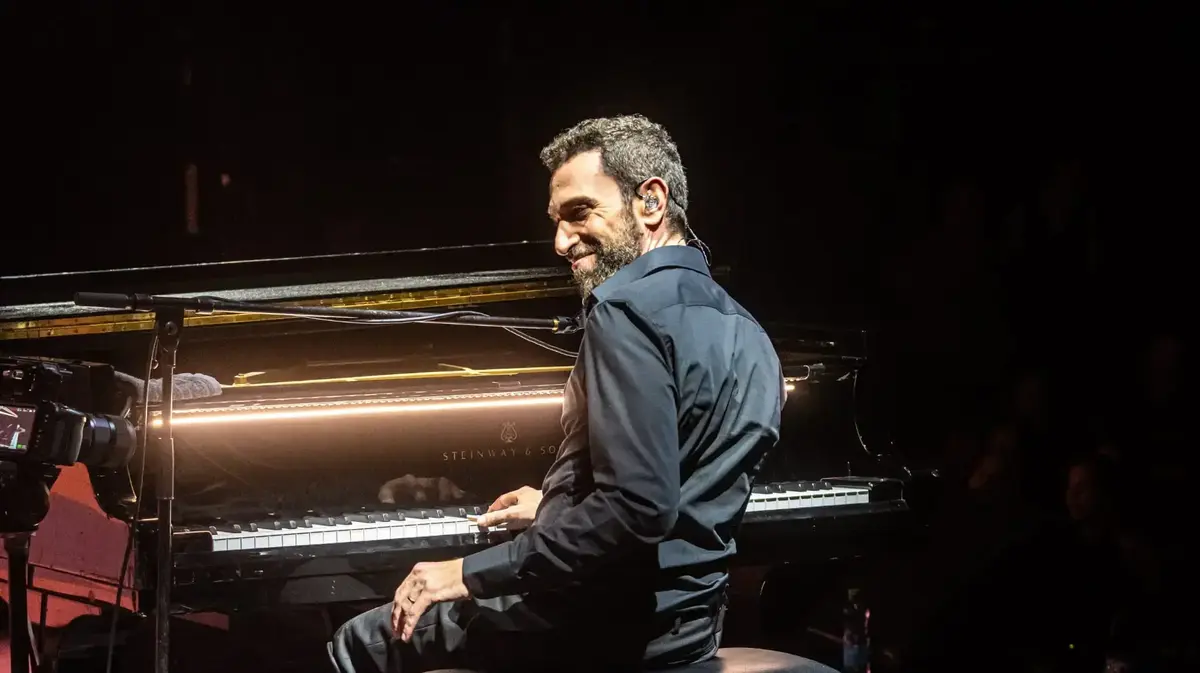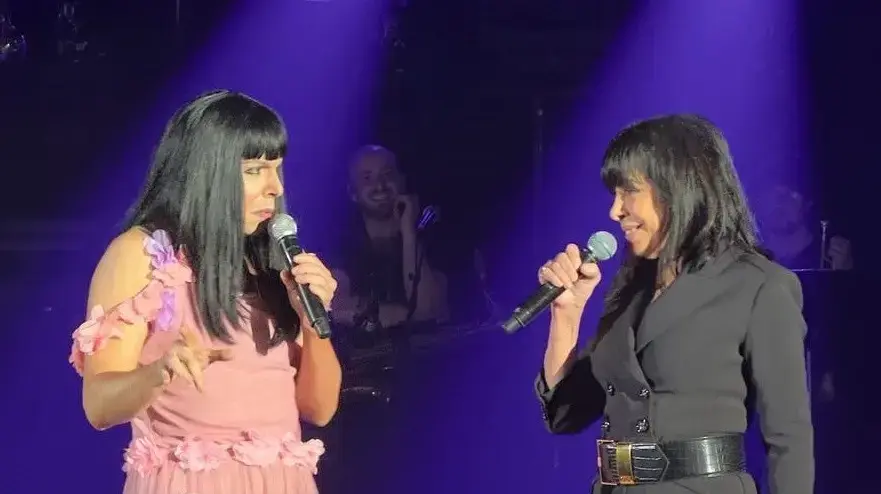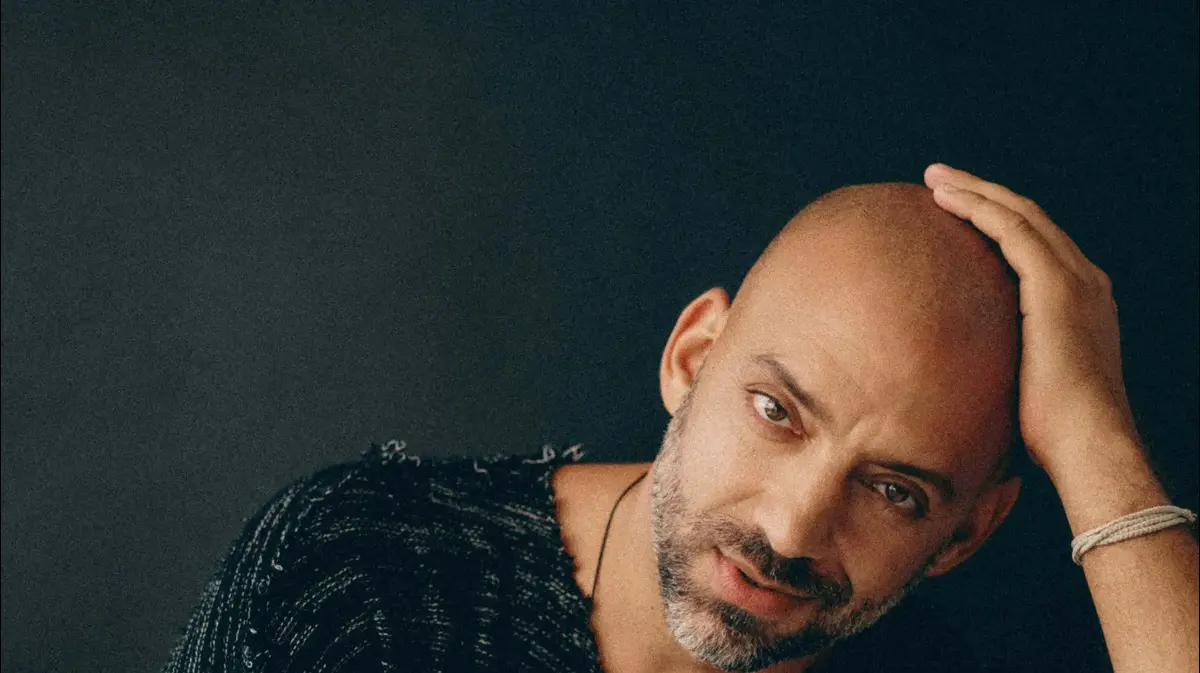wow
Shlomi Shaban in concert (Photo: Lior Keter)
wow
In an age of bottom lines, sometimes grandiose events need to be summed up in one word.
If you have to choose one such word to describe Shlomi Shaban's performance, last night at the Opera House in Tel Aviv, you have no choice but to go for "wow".
Not exactly a word, really.
More like an involuntary reaction of a soul that has already seen a show or two.
If the editor generously allows me three more words, then we'll go: "Wow, that was bad."
This is also a great title.
The editor will love it.
A title that will attract the haters.
the cynics
the disgruntled.
It will be excellent for traffic, for ratings, for the herd that likes to trample its idols.
And it won't be a lie.
Shlomi Shaban was really bad yesterday.
worse than ever.
Bad for glory.
Bad in the best sense of the word.
Let's start with the good actually, both because that's how it is customary and because there was a lot of it.
pure goodness.
Shlomi Shaban's choice to premiere the album "Open House" at the Opera House is anything but accidental.
This is the third time that Shlomi has chosen the most elaborate and impressive stage in Israel to inaugurate a new album.
It's not the biggest or the most comfortable hall, but it has the most versatile stage there is, one where you can do things that you can't do anywhere else - and this flexibility also corresponds well with Shaban's music, and especially with his ambition.
Ben takes the stage with a single spot shining on him.
Behind him is a black screen that hides the talented band.
In front of him is a screen that projects ripples that spread in three dimensions around the stage.
For moments it seems that the waves come out of the stage and flow into the audience.
Without his piano, Shaban looks naked, exposed, despite the tailored suit.
He sings as if reciting the lines he wrote from the belly of a shipwreck, in complete darkness and with a clear mind.
This is the song that opens the new album.
It's called "Don't ignore me" and this title feels ironic in front of the mesmerized eyes in the audience.
No one is looking at the phone.
No one is taking pictures.
You can feel the salt of the waves, like the tension of the spectators.
No one even dreams of being ignored.
More in Walla!
With the most important song of the year and a perfect gift from Miri Mesika: Shlomi Shaban is back in a big way
To the full article
Fresh songs without preparation.
Shlomi Shaban in concert (Photo: Lior Keter)
The screens go up, revealing one of the most spectacular stages ever assembled in Israel, certainly when it comes to "just a pop-rock performance".
The stage plays a role here, and its design has a critical effect on the feeling.
It's not a musical, not an opera.
Simply a performance that was invested with thought and creativity from another world.
The stage design, the lighting, the video art - everyone took part in the show as much as the band.
The setting looked operatic, appropriate for the place, and set a very high standard for the musicians on stage.
Spoiler: they will live up to it.
Meir Ariel, Shaban's teacher and rabbi, used to "prepare" his audience at concerts before new songs.
He asked them to treat them like new immigrants, with an absorption basket and all.
In contrast, Shaben usually talks to his audience a lot before the old songs in the set.
The newer songs are thrown to the audience without preparation and without explanation.
He also did this in debut performances that accompanied previous albums.
This adds some mystery to the songs, certainly in such a personal album as the recent "Open House", which includes some of Shaban's most exposed songs - alongside some of his most pretentious musical attempts.
Shaben performed the first five songs on the album in sequence, almost without considering the large audience in front of him.
Miri Mesica joined in a precise-but-not-exciting performance of the duet "La Vita a Longa".
Later, she stepped into Meir Ariel's shoes - when she replaced live the symphony of "Tsouai Ahabhtunu", which opens the spoken word piece "Your Wife's Lover".
The segment is almost as unnecessary as it is long (over seven minutes), precisely because it conveys a rare lack of sincerity on the part of Ben, who performs the piece in an exaggerated but humorless cabaret manner.
A reasonable chance that this piece will later disappear from the set.
And maybe not.
You will also be interested:
Yoram Gaon: "The last thing I care about is if they play my new songs" The
Oscar winner was surprised live with her favorite singer, Nega Erez
"Artists tend to keep their political opinions to themselves. I feel differently"
More in Walla!
Netflix's new hit is a lousy Borax movie that borders on anti-Semitism
To the full article
turned bad
Shlomi Shaban in concert (Photo: Lior Keter)
Then came the first of several high points in the show, with the song "Canaan" which describes the biblical story of the spies. If someone wants to identify in the song allegories for more current matters, they are welcome to do so on their own accord, as long as it is legal. A line like "My face maybe "Not for peace, but not for war," could be the mantra of an entire public in Israel, who, like the boiling frogs, does not understand that the water around them is already boiling. And on the other hand, it could also be Shaban's personal observation about his creative repertoire. And perhaps, in fact, this is really just the story of Moshe Rabbnu and there is nothing to look for additional layers in. Are all the answers correct?
With Ravid Plotnik and Shuli Rand by his side, the line "I'm just a wandering Jew, I was born to separate" is even more penetrating than expected when delivered live.
Unlike the album version, Shaban repeated this line again towards the end of the song.
This is the most beautiful line Shavan has written in years, despite (and perhaps because of) the inaccurate masculine rhyme, and last night it was the opening shot for Shavan's "farewell" from the stately facade of the brilliant creator who came to present his art to his audience.
That was the moment he became "bad".
After five new songs, Shaben turns to the audience and tells that he is going to perform a song from the previous album, which means, technically, that it is already quite an old song - but its theme is "Eternal Man".
The song, "Family Photo with the Prime Minister", was written by Shaban in other days.
Also on a personal level - when a son was not yet a father, for example - but mainly on a national level.
Days when protest songs by musicians were not a rare commodity in Israel, and you could still hear artists speaking out strongly against the government.
Still a democracy.
Last night, the same song, with the same lyrics, suddenly felt forbidden.
This is the same prime minister that Shavan wrote about in 2014, but the humor that Shavan weaved into the lyrics of the song has been replaced by authentic rage.
Ravid Plotnik returns to the stage, and balances Shaban's protest with a different perspective.
Plotnik almost attacks Shevan with the last verse of the song "Victim", in which he blames countless things on his personal situation instead of taking responsibility.
The mash-up between the songs is perfect.
Shaban sings about how "they don't elect a prime minister", while Plotnik rants about looking for culprits in his situation, shouting: "It's Bibi, you know what? It's Bibi! It's only Bibi!".
With Plotnik it may be upside down, while with Shaban it is a statement.
At the end, the two songs meet, and the two talented creators sing the last line together, the one that tells about another prime minister, whose blood washed the stairs while the air was washed with fear.
"It hasn't hurt for a long time," they both repeat the mantra, as if trying to convince themselves.
For a moment you can believe it, then the screen comes down again on the stage.
The hall is in Alta when in the background the loudspeakers suddenly play Eitan Habar shouting about the Israeli government which announces in astonishment.
I write this and the chills go through my body again.
Any Israeli of a certain age cannot ignore these words.
Suddenly, the face of Minister Itamar Ben Gabir, in huge size, is projected on the stage in 4K quality, and thousands of people look at him in horror like Dorothy and her friends, when they meet the Wizard of Oz for the first time.
Ben Gvir's face is replaced by Smotrich's.
Then comes Shlomo Karai's face.
of Miri Regev.
of Levin's opponent.
At the end it is the huge face of Benjamin Netanyahu, which is projected hugely, in blue, on the stage.
Underneath it we discover a grand piano made by Steinway & Sons, perhaps the most recognized standard for quality music.
The black piano is covered with the flag of Israel, and on top of it lies a wheel of grief-stricken flowers, which symbolizes one thing for every Jew: mourning.
It was hard to escape this image, the black piano just looked like a coffin.
It felt like a funeral service, and the audience's shock was expressed in deathly silence.
The opera house became a cemetery.
It was not a sudden music performance, but a protest in the form of a visual art piece.
When Ben himself broke the silence, and humorously asked: "What, too dramatic?", the audience responded with polite giggles, only to realize that the drama had not yet reached its peak.
More in Walla!
"Shrinking": Harrison Ford and friends make this series something hard to resist
To the full article
It was hard to escape the image.
Netanyahu's huge face at Shlomi Shaban's concert (Photo: Walla! Group, Amit Salonim)
Shaban performed "Duty Free" - with this time his protest felt much more determined - and continued to "Please, Please, Please" by Leonard Cohen.
In Shaban's translated version, as originally performed by Shai Zabri, the hymn turned from a soldier's dialogue with his God, to a lament of longing for her beloved.
This time, Shaban stated that the words "Please, my love, please come back to me" are dedicated to the State of Israel.
At this moment, two people in the audience stood up, gestured in displeasure to the stage, and left the hall in protest.
I doubt if the son even noticed.
Doubt if it even matters, mainly because everyone else has stayed.
At the end of the song, many stood and applauded.
Quite a few were tearful.
each for their own reasons.
Opinions differ about the use of art for political purposes, but those who oppose the talk often speak from a position.
The artists who are silent on issues in the world are often infected by interests, and sometimes also blinded by too much privilege.
Many artists would prefer to ignore the situation around them in order to continue selling tickets to a wider audience, while a few artists will go with their truth and bring a public relations disaster upon them by taking a stand. Shlomi Shaban did not "need" to use the stage of the opera to issue a clear and sharp protest against the Netanyahu government , but he is confident enough in his art, believes enough in his audience, to know that his music can express a position without it being damaged. It takes a lot of courage for that, certainly in the current situation.
Maybe it's the parenting that changed him, and made him more "bad", like a lioness who smells someone who comes to harm her cubs.
Maybe it's the vacuum left behind by the friend Aviv Gefen, who found new audiences beyond the Green Line.
Maybe he is no longer "okay" with this violence, as he wrote in a previous incarnation.
That Ben pulled out his claws precisely on an evening that was supposed to celebrate new and pure music, it only made his protest more authentic, braver, and much more resonant.
More in Walla!
not lost
Sadness and loneliness took over Israeli music at the end of 2022
To the full article
There was no politics in this choice.
Shuli Rand joins Shlomi Shaban in a concert (Photo: Lior Keter)
The rest of the show found Shaban with the audience eating out of his hand.
The return to the old songs, with the super talented band behind it, felt more natural and clear.
There was no more politics there, so to speak, even if Maya Belzitzman's cello at the end of "Exercise in Awakening" sounds like a true alarm.
The choice to give the stage to the Druze musician Tapesh, for an Arabic performance of "Arik", can also be interpreted as political.
However, in the end, it was a purely musical decision.
After almost half a jubilee of attempts to escape from the hit that stuck to Shavan like a catchy parasite, a new and fresh version of the song was finally found that Shavan would have preferred long ago to release from the setlist.
For the first time since the year 2000, suddenly "Eric" became something original and fun again.
If along the way it pisses off some racists, that's just a bonus.
In contrast, there was also no politics in the choice to incorporate Shuli Rand into the song "We Moved to the North", which suddenly became a song about a change of focus to an even deeper lifestyle change.
Instead of the repeated chorus of "Now look at Shakdia, at the Hare's flower", Rand sings: "Now kiss the mezuzah, dip in the mikveh of the Ari." The truth is, it's so fitting that it's hard to see how Ben won't be tempted to continue this change in future performances as well.
The performance included many other highlights, such as the song "Romansa (Tel Amid Livach)" performed perfectly together with Neta Elkayam and Avishi Cohen, the change of genders in "Gallin Meyrin" performed by Maayan Linik (who proved that she is much more than "the daughter of"), And for dessert came "Nuri", the exciting song from the new album, which closed the entire show together with the Tel Aviv Soloists Ensemble. But more than that it was a spectacular show by one of the most interesting active creators in Israel of the last decades, it was a rare show with a statement that went beyond music.
At the end, when the doors opened, the crowd was in no hurry to leave.
Outside, life in Tel Aviv didn't seem particularly magical.
The roads were blocked for digging, whistles were heard from the parking lots and people tried not to be run over by electric scooters.
So strange that life went on as usual, amid the routine of despair, while inside the hall for a moment one could feel so much hope.
culture
Tags
Shlomi Shaban
Performance review









